MURRAY ADVOGADOS
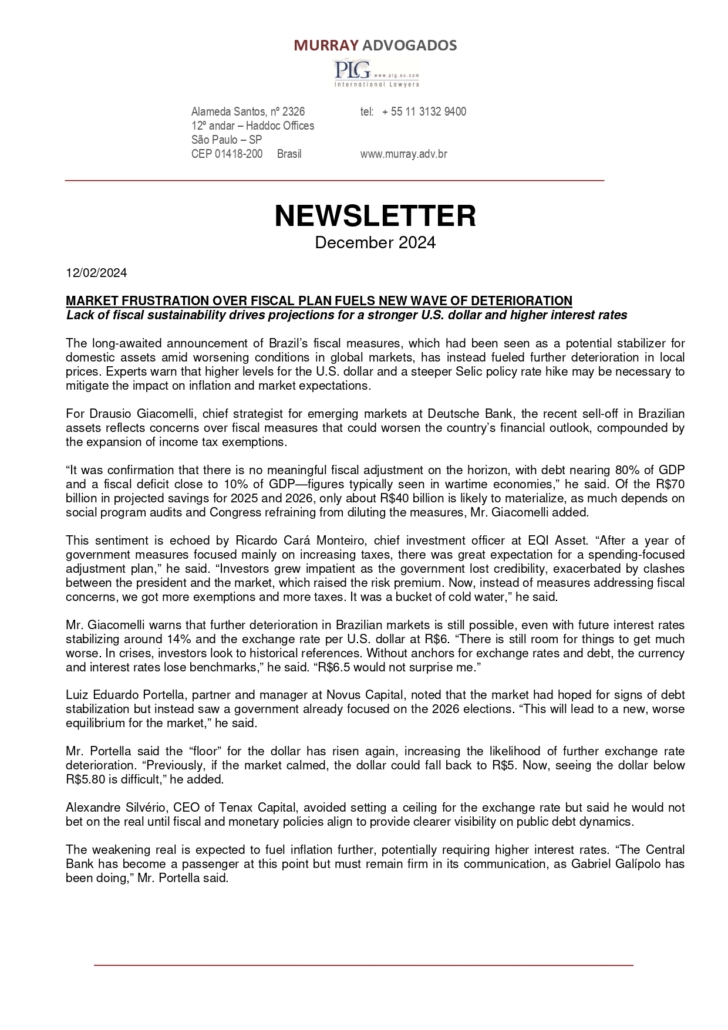
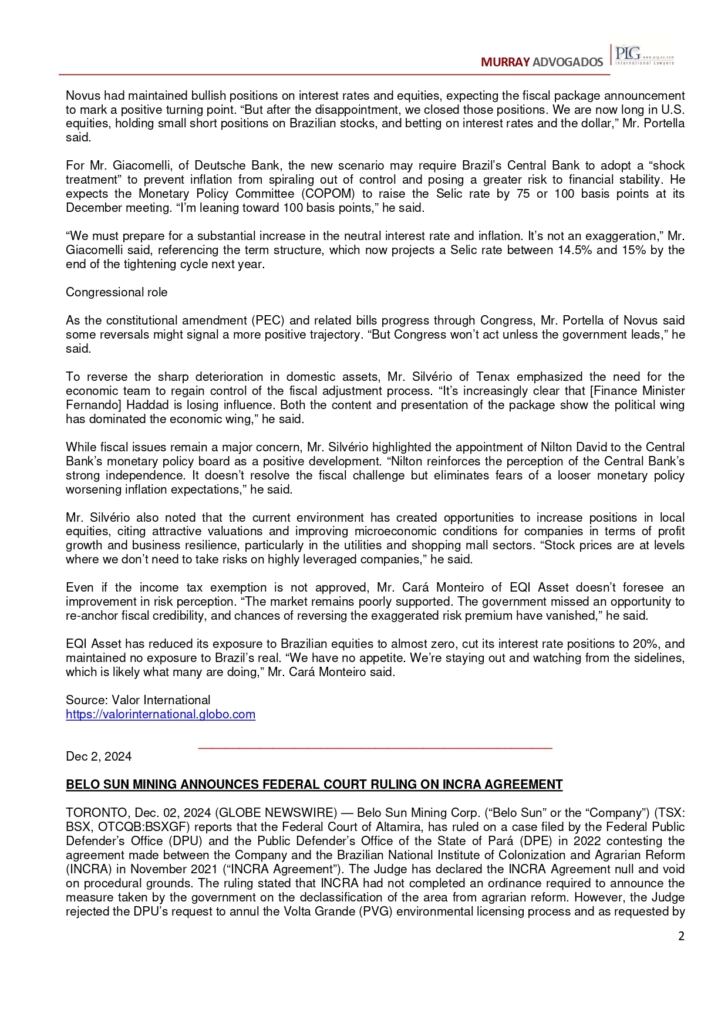
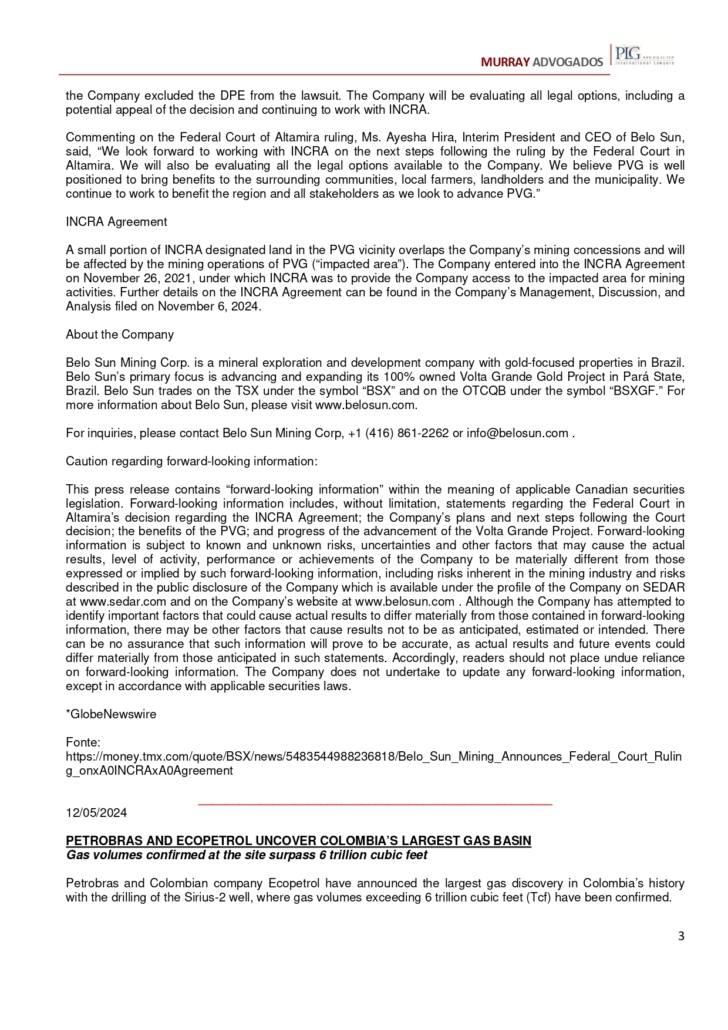
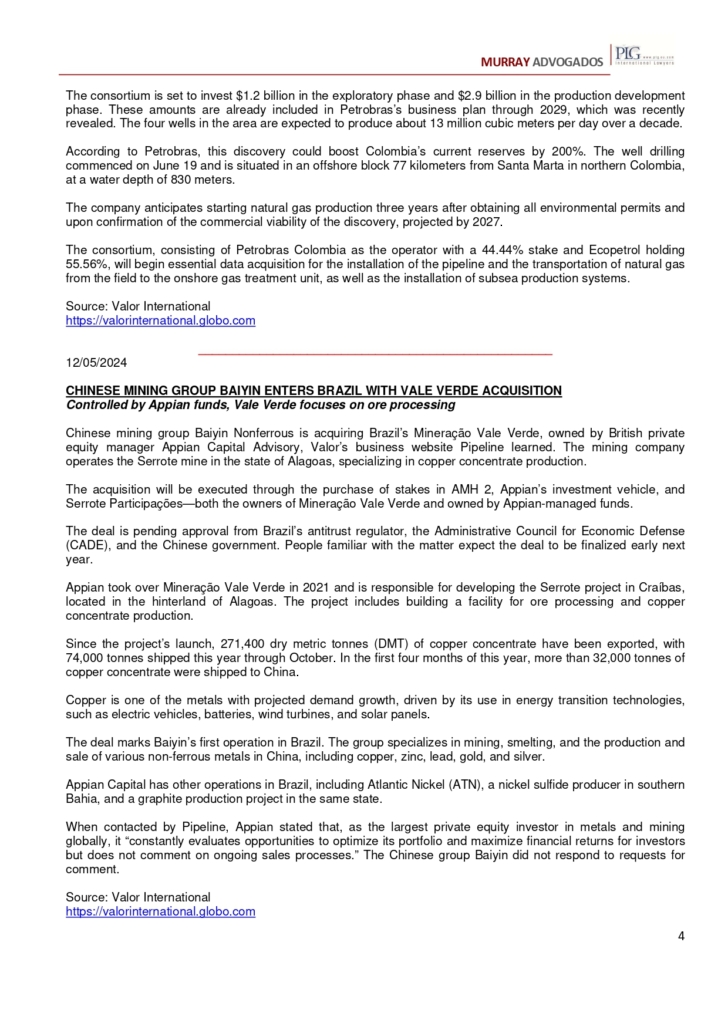
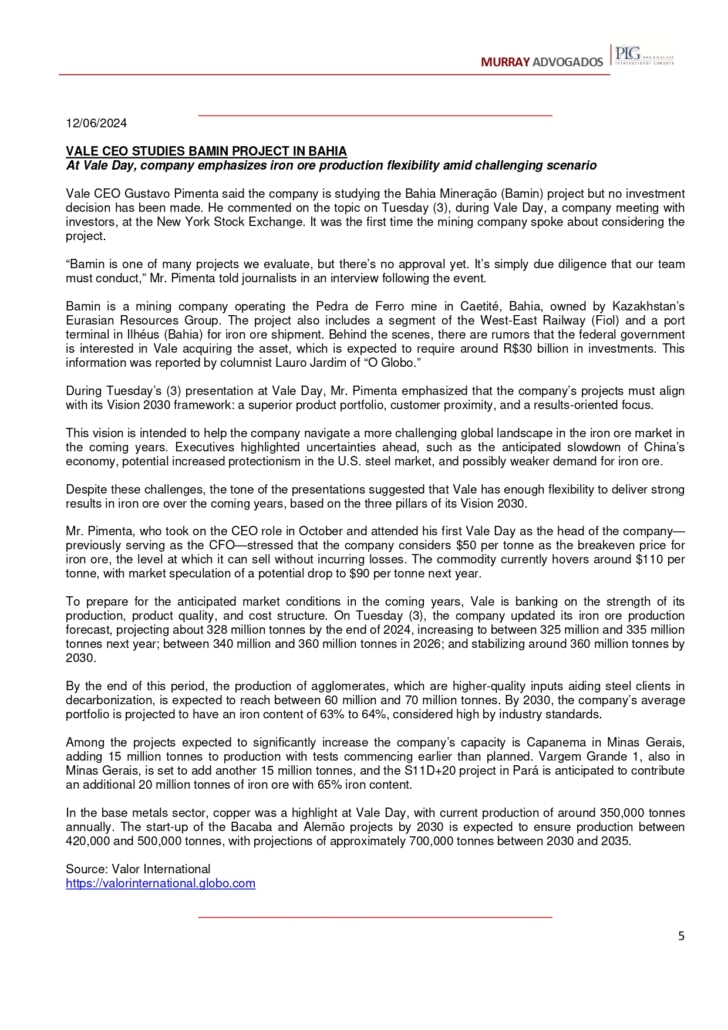
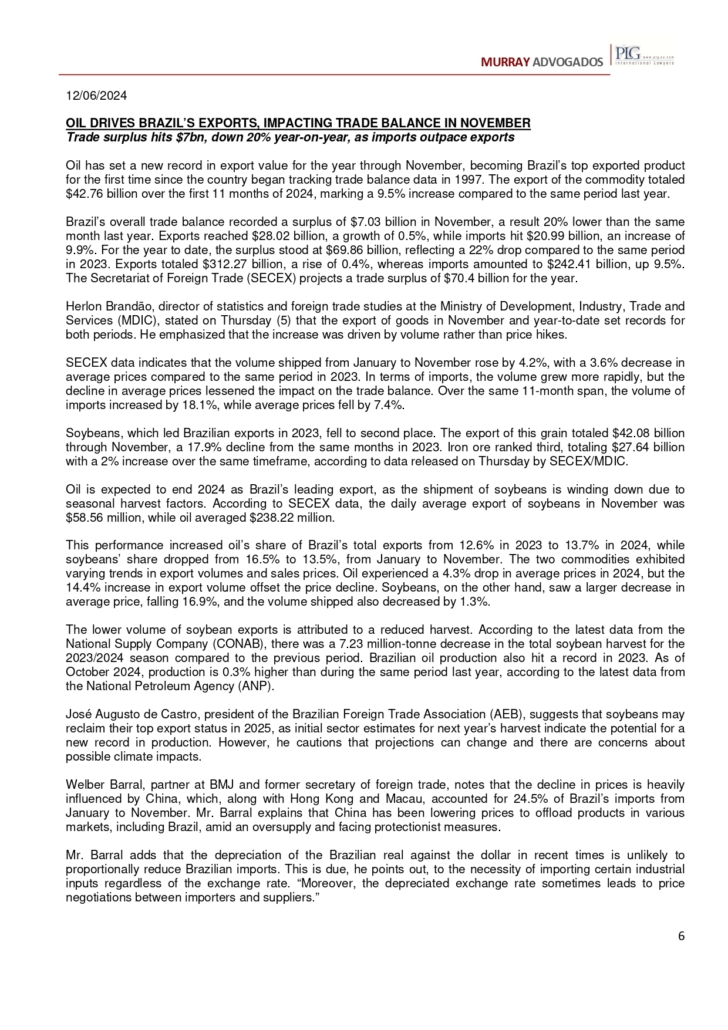
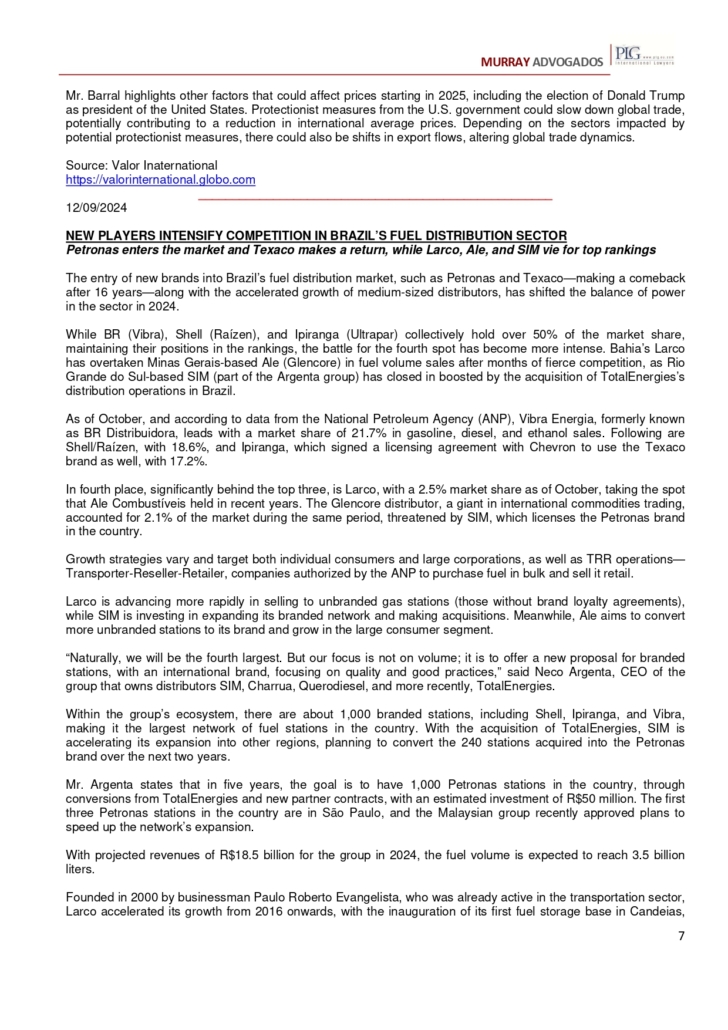
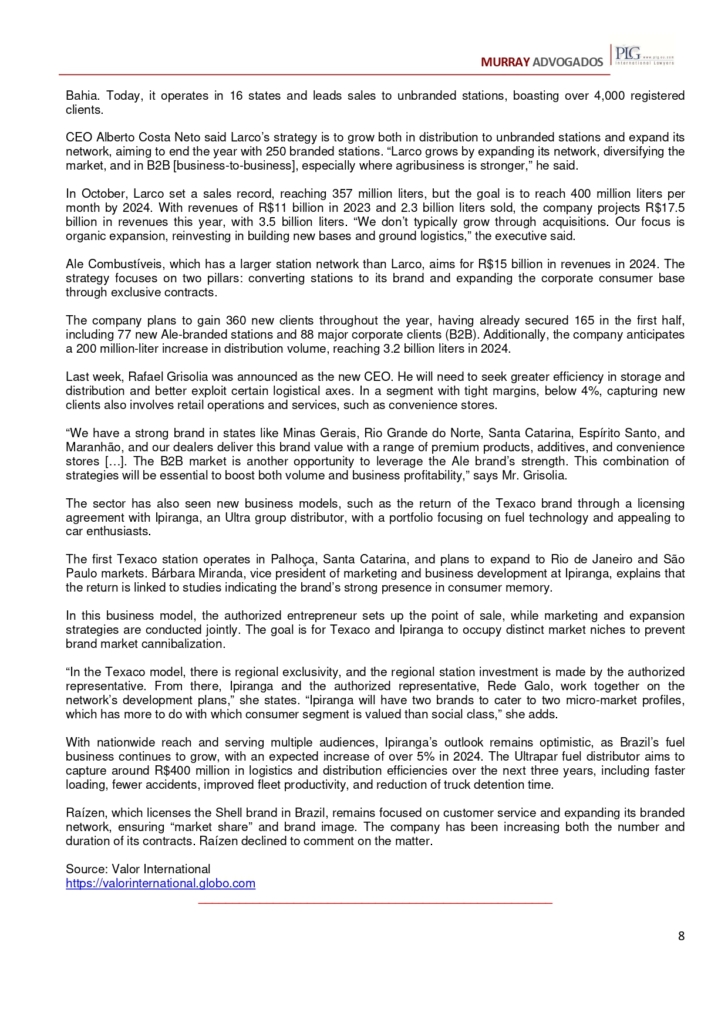
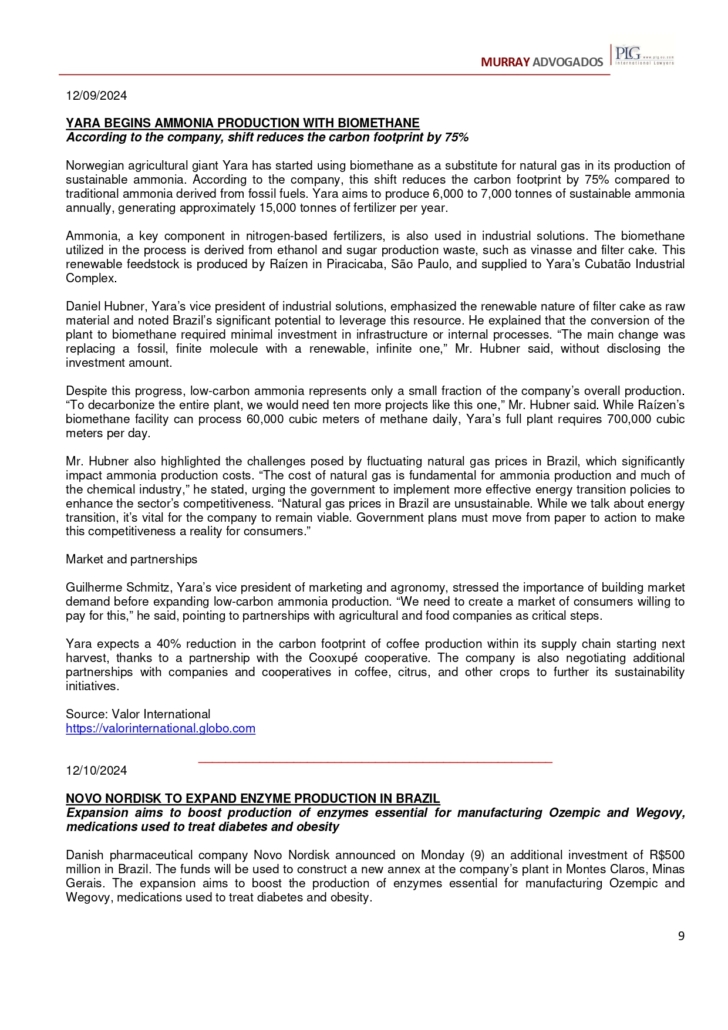
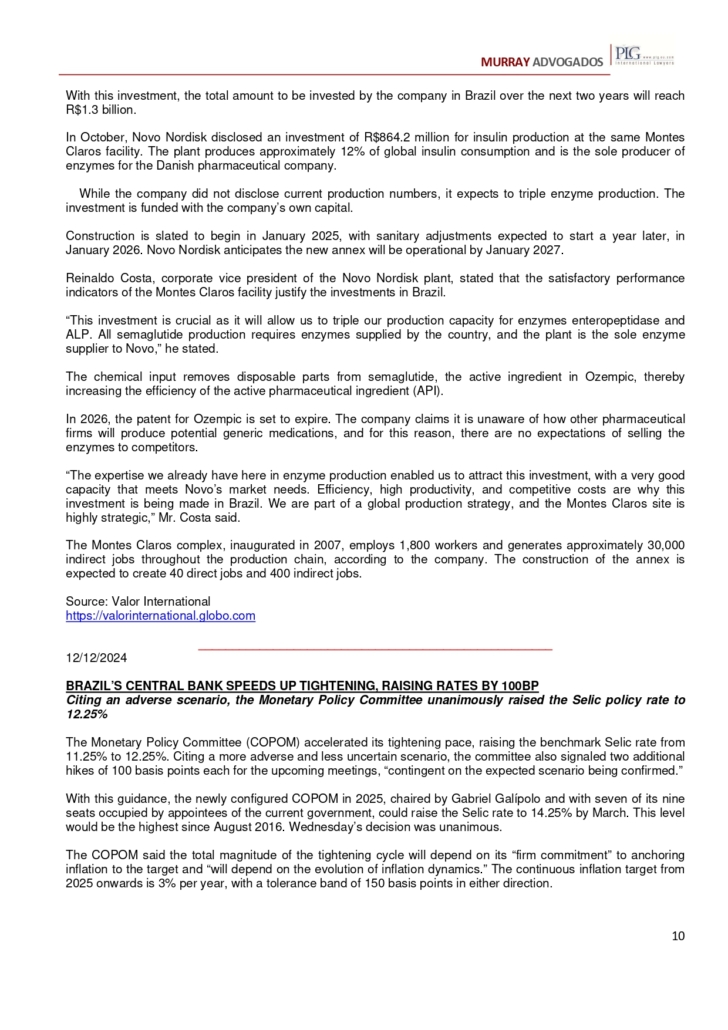
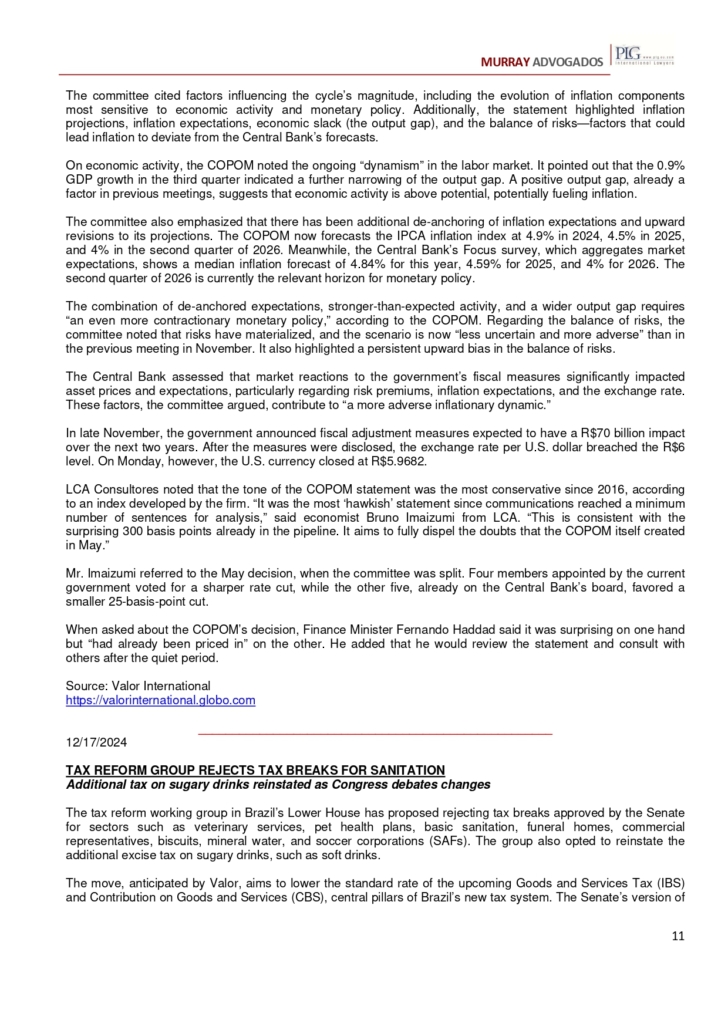
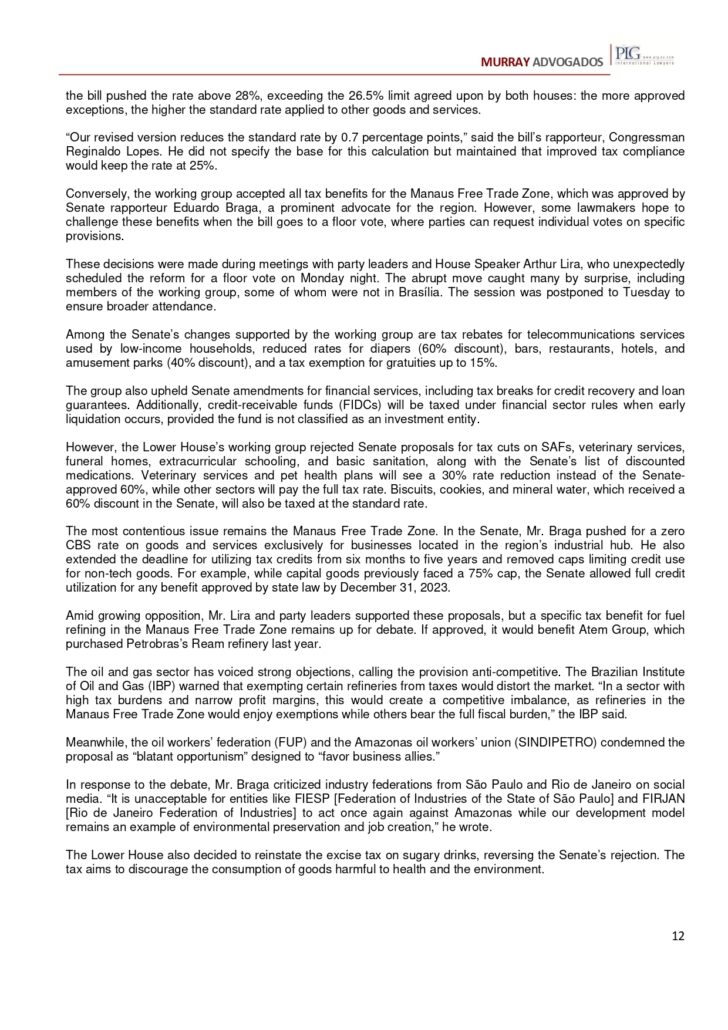
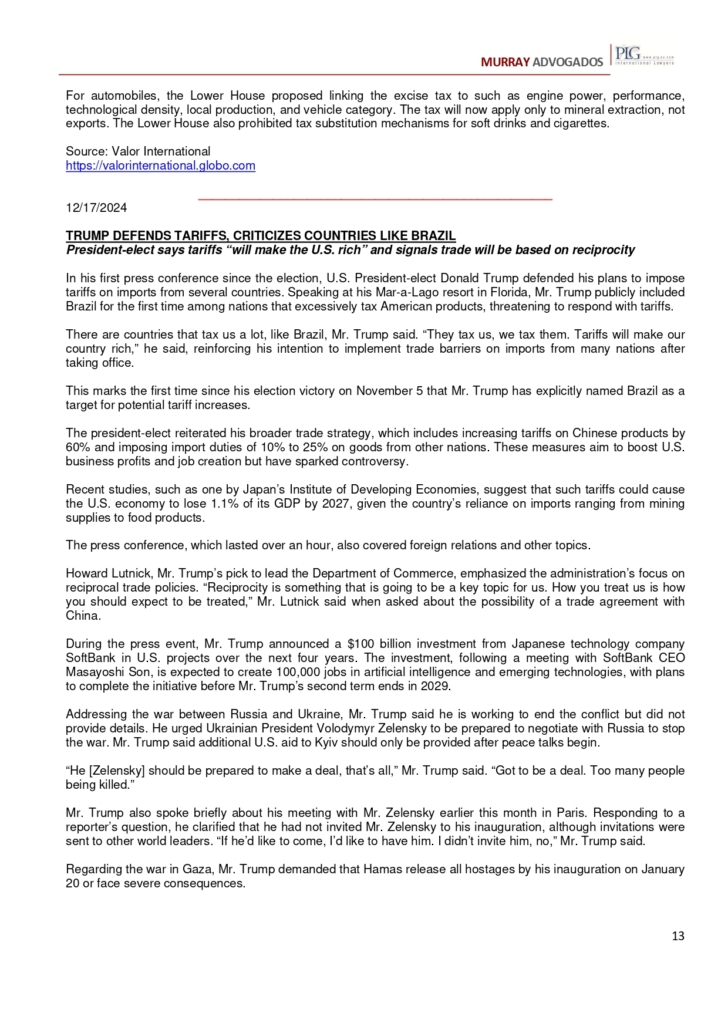
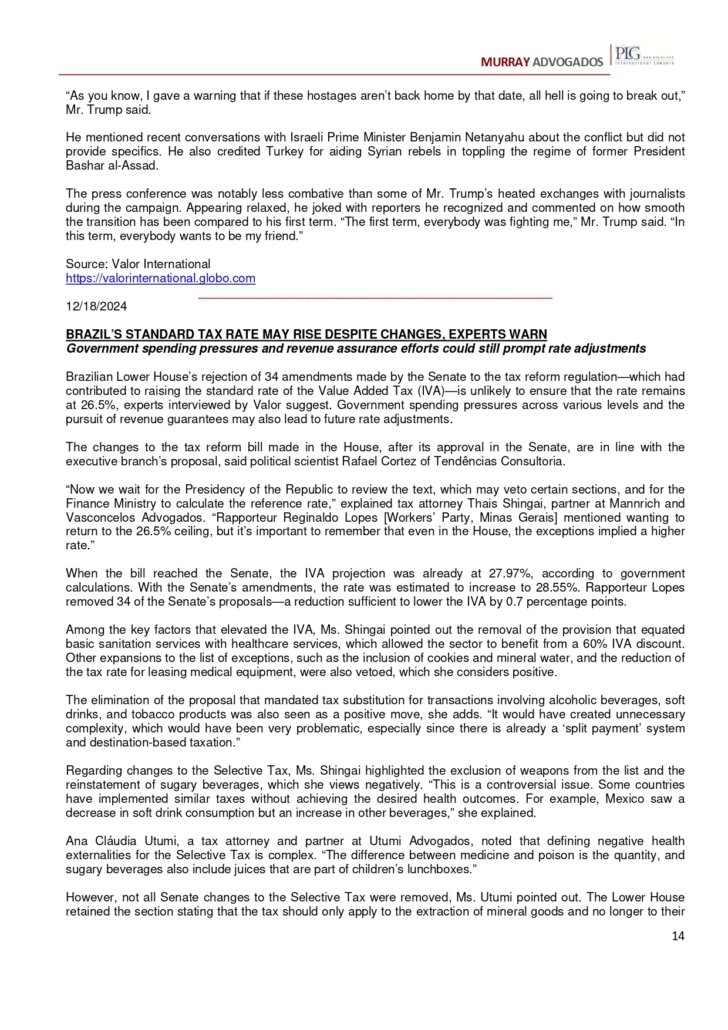
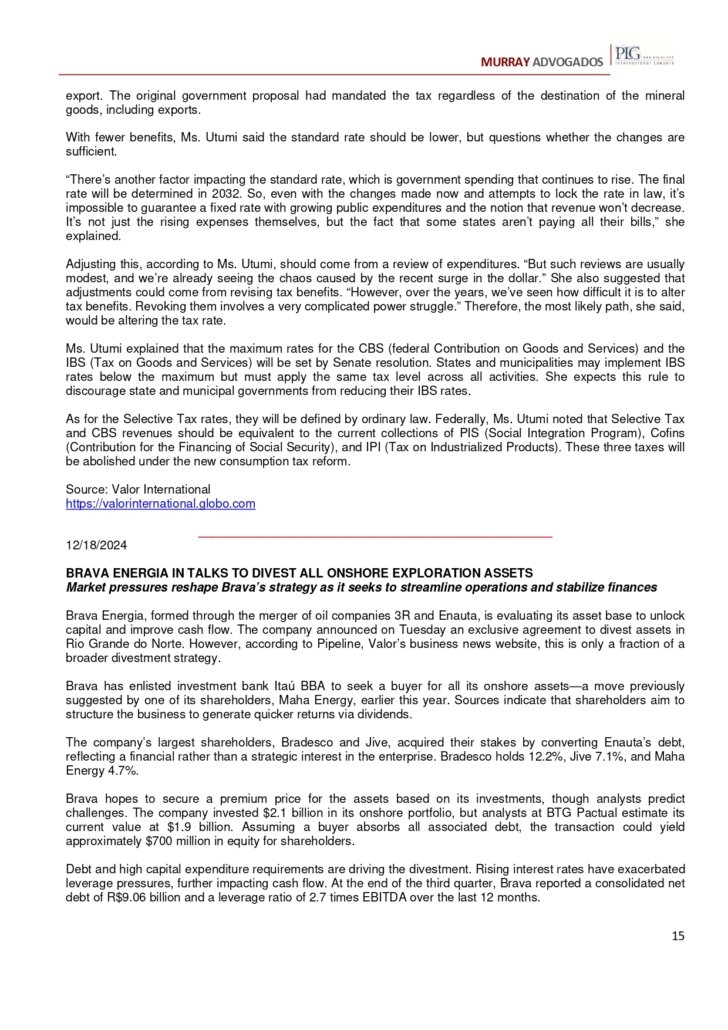
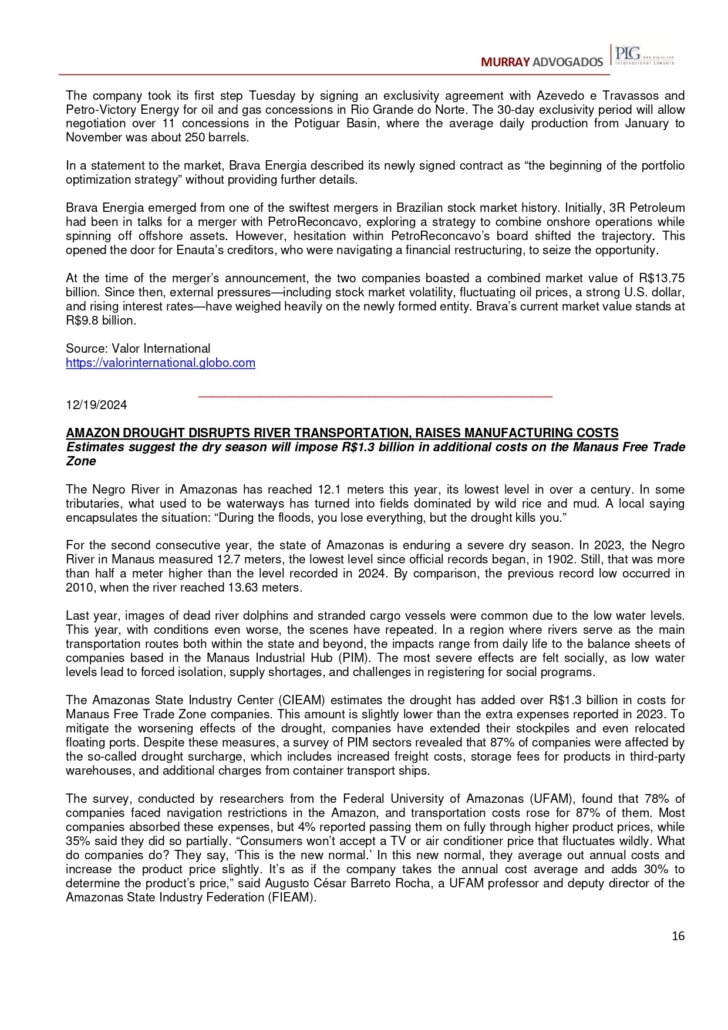
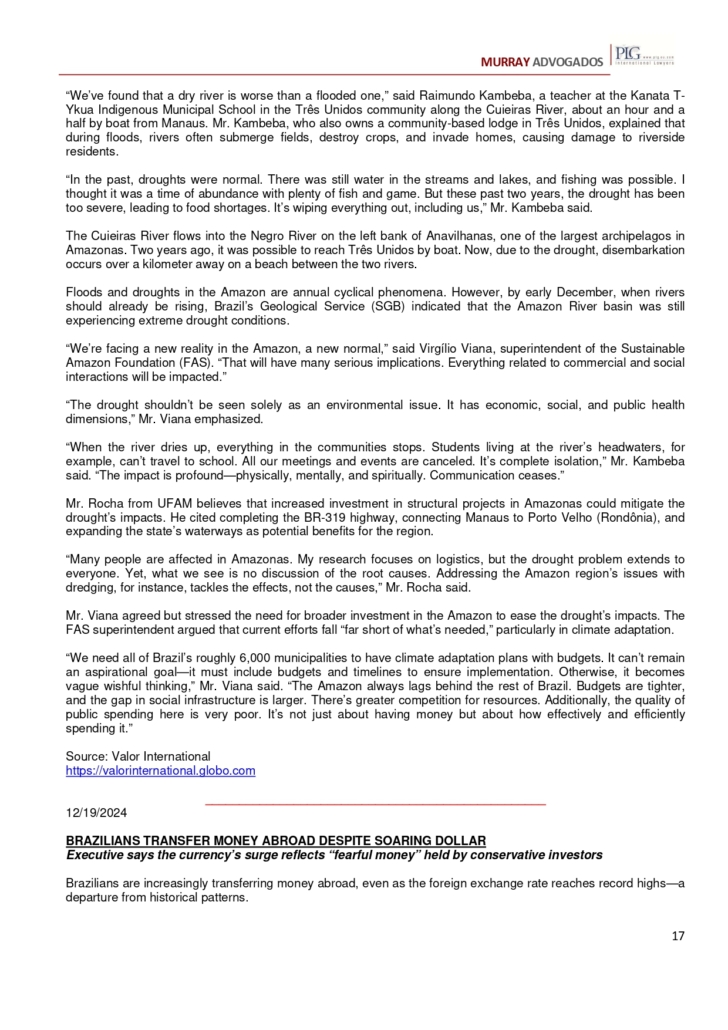
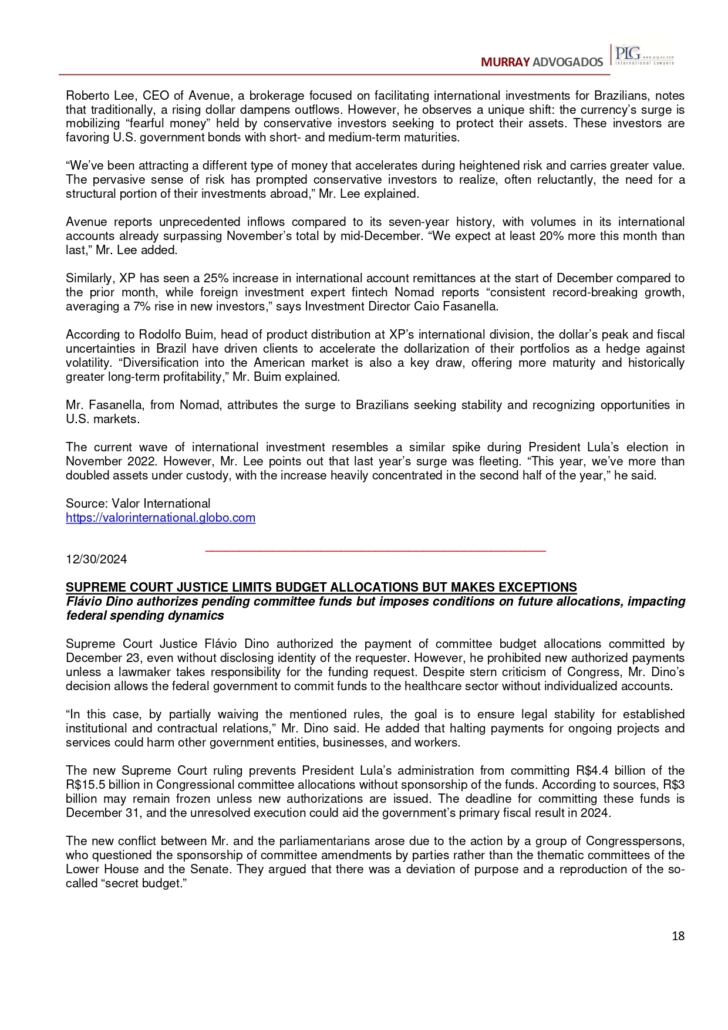
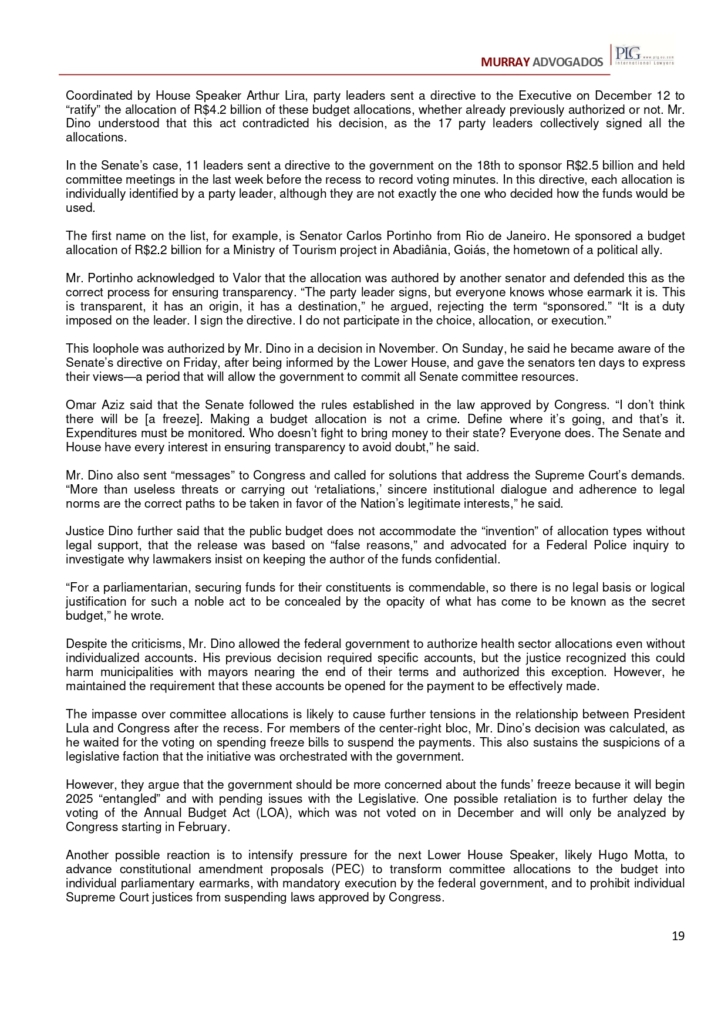
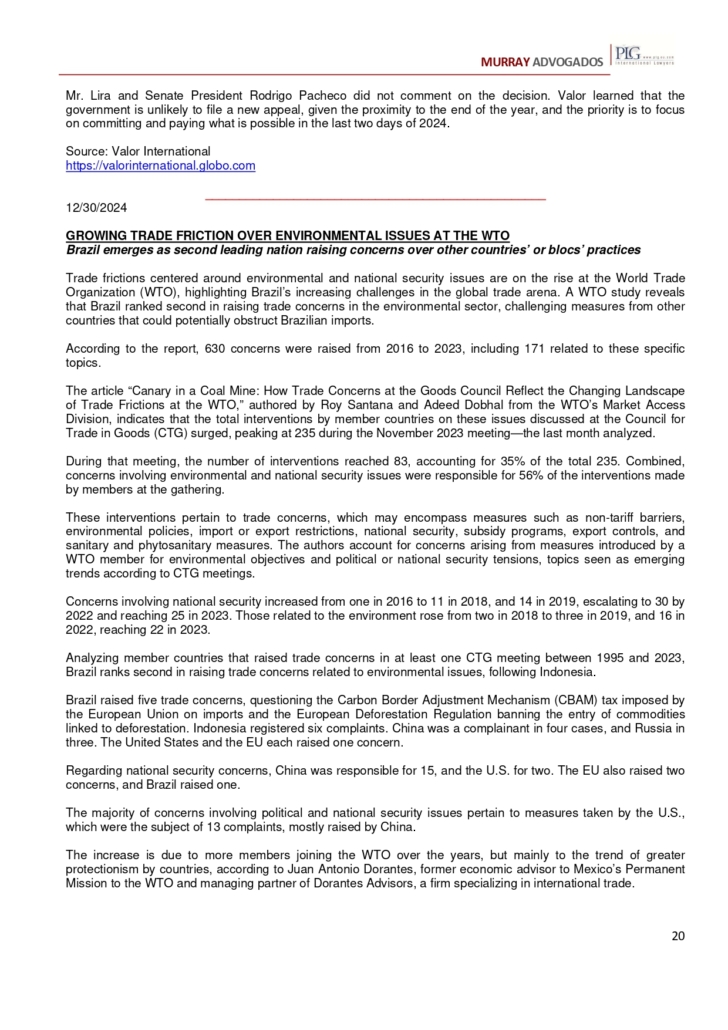
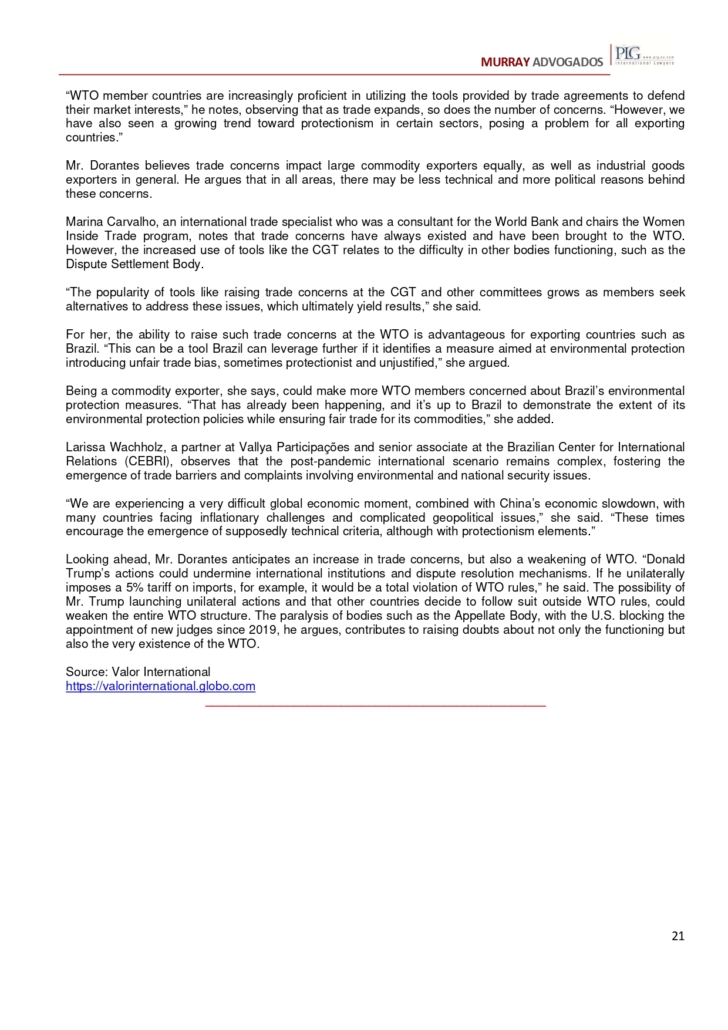
MURRAY ADVOGADOS





















12/30/2024
Amid one of the leanest periods for stock offerings on the Brazilian exchange, banks are witnessing a notable surge in share buybacks within their brokerage divisions. With market valuations depressed and no clear signs of recovery, companies are ramping up efforts to repurchase their own shares, seeing it as the most strategic allocation of cash under current conditions.
A survey by Valor Data, based on data from B3, reveals that 98 companies approved buyback programs in the year ending November, a 20% increase compared to all of 2023. The figure surpasses 100 when including companies listed abroad, such as XP and Stone, which recently announced multi-billion-dollar buyback initiatives.
According to B3, the total number of active buyback requests—some approved in prior years—now exceeds 110 companies, approaching a financial volume of R$80 billion.
For instance, when calculated at their maximum allowed repurchase volumes, the combined buyback programs of B3 Exchange, Eletrobras, and JBS surpass the total raised through subsequent stock offerings this year. Excluding Sabesp, which alone accounted for over half of the R$25 billion offering volume in 2024, this underscores the broader impact of diminished market values across most companies.
An investment banker notes that many firms view buying back their own shares as the best investment option in an environment dominated by risk aversion. This sentiment has gained traction amid the ongoing cycle of interest rate hikes, further deterring investors from the equities market. “In some cases, we are advising clients that the most prudent investment is in their own securities,” the source shared, adding that controlling shareholders are also exploring financing options to purchase shares in their own companies.
Celso Nishihara, a partner in Fator Bank’s mergers and acquisitions division, highlights that share buybacks can serve as a strategic tool for boards to create shareholder value. Companies can improve financial ratios and reduce shareholder dilution by repurchasing shares, particularly if the repurchased shares are subsequently cancelled. This approach immediately boosts earnings per share. “A company understands its own stock better than any other asset; there’s no information asymmetry in this case,” he explains.
The Fator Bank executive emphasizes that while share buybacks can be a useful tool, they are not a substitute for a growth strategy. “It cannot replace mergers and acquisitions (M&A) or investments in a company’s core business,” he notes. Additionally, he cautions that companies must avoid over-leveraging to finance buybacks. Under current regulations, directors may approve share acquisitions only if the company’s financial situation allows for their settlement without jeopardizing obligations to creditors or the payment of mandatory dividends. Moreover, sufficient resources must be available for such transactions.
Vitor Rosa, from Scotiabank’s capital markets division, links the surge in buybacks directly to the undervaluation of shares. Currently, the price-to-earnings ratio is 7.6 times, significantly below the 10-year average of 10.6 times. Mr. Rosa advises companies to evaluate business growth opportunities alongside buyback programs.
Leonardo Cabral, head of investment banking at Santander Brasil, observes that well-capitalized companies see buybacks as an efficient way to utilize cash reserves. “The capital markets are not reflecting the fair value of companies,” he asserts.
Analyst João Daronco from Suno Research adds that companies with strong operational performance and robust cash generation are increasingly opting for buybacks. “It’s one of the options for allocating cash,” he explains, citing companies like Vale and B3 as examples. He also notes that buybacks could gain further traction if dividend taxation is implemented, as businesses might turn to this instrument as an alternative.
The companies referenced in this analysis were not available for comment.
*By Fernanda Guimarães — São Paulo
Source: Valor International
12/30/2024
Trade frictions centered around environmental and national security issues are on the rise at the World Trade Organization (WTO), highlighting Brazil’s increasing challenges in the global trade arena. A WTO study reveals that Brazil ranked second in raising trade concerns in the environmental sector, challenging measures from other countries that could potentially obstruct Brazilian imports.
According to the report, 630 concerns were raised from 2016 to 2023, including 171 related to these specific topics.
The article “Canary in a Coal Mine: How Trade Concerns at the Goods Council Reflect the Changing Landscape of Trade Frictions at the WTO,” authored by Roy Santana and Adeed Dobhal from the WTO’s Market Access Division, indicates that the total interventions by member countries on these issues discussed at the Council for Trade in Goods (CTG) surged, peaking at 235 during the November 2023 meeting—the last month analyzed.
During that meeting, the number of interventions reached 83, accounting for 35% of the total 235. Combined, concerns involving environmental and national security issues were responsible for 56% of the interventions made by members at the gathering.
These interventions pertain to trade concerns, which may encompass measures such as non-tariff barriers, environmental policies, import or export restrictions, national security, subsidy programs, export controls, and sanitary and phytosanitary measures. The authors account for concerns arising from measures introduced by a WTO member for environmental objectives and political or national security tensions, topics seen as emerging trends according to CTG meetings.
Concerns involving national security increased from one in 2016 to 11 in 2018, and 14 in 2019, escalating to 30 by 2022 and reaching 25 in 2023. Those related to the environment rose from two in 2018 to three in 2019, and 16 in 2022, reaching 22 in 2023.
Analyzing member countries that raised trade concerns in at least one CTG meeting between 1995 and 2023, Brazil ranks second in raising trade concerns related to environmental issues, following Indonesia.
Brazil raised five trade concerns, questioning the Carbon Border Adjustment Mechanism (CBAM) tax imposed by the European Union on imports and the European Deforestation Regulation banning the entry of commodities linked to deforestation. Indonesia registered six complaints. China was a complainant in four cases, and Russia in three. The United States and the EU each raised one concern.
Regarding national security concerns, China was responsible for 15, and the U.S. for two. The EU also raised two concerns, and Brazil raised one.
The majority of concerns involving political and national security issues pertain to measures taken by the U.S., which were the subject of 13 complaints, mostly raised by China.
The increase is due to more members joining the WTO over the years, but mainly to the trend of greater protectionism by countries, according to Juan Antonio Dorantes, former economic advisor to Mexico’s Permanent Mission to the WTO and managing partner of Dorantes Advisors, a firm specializing in international trade.
“WTO member countries are increasingly proficient in utilizing the tools provided by trade agreements to defend their market interests,” he notes, observing that as trade expands, so does the number of concerns. “However, we have also seen a growing trend toward protectionism in certain sectors, posing a problem for all exporting countries.”
Mr. Dorantes believes trade concerns impact large commodity exporters equally, as well as industrial goods exporters in general. He argues that in all areas, there may be less technical and more political reasons behind these concerns.
Marina Carvalho, an international trade specialist who was a consultant for the World Bank and chairs the Women Inside Trade program, notes that trade concerns have always existed and have been brought to the WTO. However, the increased use of tools like the CGT relates to the difficulty in other bodies functioning, such as the Dispute Settlement Body.
“The popularity of tools like raising trade concerns at the CGT and other committees grows as members seek alternatives to address these issues, which ultimately yield results,” she said.
For her, the ability to raise such trade concerns at the WTO is advantageous for exporting countries such as Brazil. “This can be a tool Brazil can leverage further if it identifies a measure aimed at environmental protection introducing unfair trade bias, sometimes protectionist and unjustified,” she argued.
Being a commodity exporter, she says, could make more WTO members concerned about Brazil’s environmental protection measures. “That has already been happening, and it’s up to Brazil to demonstrate the extent of its environmental protection policies while ensuring fair trade for its commodities,” she added.
Larissa Wachholz, a partner at Vallya Participações and senior associate at the Brazilian Center for International Relations (CEBRI), observes that the post-pandemic international scenario remains complex, fostering the emergence of trade barriers and complaints involving environmental and national security issues.
“We are experiencing a very difficult global economic moment, combined with China’s economic slowdown, with many countries facing inflationary challenges and complicated geopolitical issues,” she said. “These times encourage the emergence of supposedly technical criteria, although with protectionism elements.”
Looking ahead, Mr. Dorantes anticipates an increase in trade concerns, but also a weakening of WTO. “Donald Trump’s actions could undermine international institutions and dispute resolution mechanisms. If he unilaterally imposes a 5% tariff on imports, for example, it would be a total violation of WTO rules,” he said. The possibility of Mr. Trump launching unilateral actions and that other countries decide to follow suit outside WTO rules, could weaken the entire WTO structure. The paralysis of bodies such as the Appellate Body, with the U.S. blocking the appointment of new judges since 2019, he argues, contributes to raising doubts about not only the functioning but also the very existence of the WTO.
*By Marsílea Gombata — São Paulo
Source: Valor International
12/30/2024
Rio de Janeiro City Hall anticipates that New Year’s Eve 2025 will inject R$3.2 billion into the city’s economy, with an estimated 5 million people attending events across the capital. Copacabana alone is expected to host 2.5 million locals and tourists ringing in the new year.
These projections are part of the second edition of Réveillon em Dados (New Year’s Eve in Data), a study conducted by the Municipal Secretariat for Urban and Economic Development (SMDUE), the João Goulart Foundation Institute (FJG), and the Tourism Company of the Municipality of Rio de Janeiro (Riotur).
According to Thiago Dias, acting municipal secretary for Urban and Economic Development, New Year’s Eve is critical for boosting the city’s economy, which will enter 2025 with thriving bars, restaurants, and hotels filled with domestic and international visitors. “We had an exceptional 2024, with remarkable shows and events, and we’re set to begin the new year just as vibrantly,” said Mr. Dias.
The report, released on Sunday, estimates that 50,000 jobs will be directly or indirectly linked to New Year’s Eve celebrations. On Copacabana’s main stage, a star-studded lineup includes performances by Caetano Veloso & Maria Bethânia, Ivete Sangalo, and Anitta.
Patrick Correa, president of Riotur, expressed optimism about surpassing last year’s milestones. In 2024, New Year’s Eve drew an estimated 5 million attendees citywide and generated R$42 million in services tax revenue—a 66.3% increase compared to the R$25.2 million collected the previous year.
*By Rafael Rosas — Rio de Janeiro
Source: Valor International
12/30/2024
Supreme Court Justice Flávio Dino authorized the payment of committee budget allocations committed by December 23, even without disclosing identity of the requester. However, he prohibited new authorized payments unless a lawmaker takes responsibility for the funding request. Despite stern criticism of Congress, Mr. Dino’s decision allows the federal government to commit funds to the healthcare sector without individualized accounts.
“In this case, by partially waiving the mentioned rules, the goal is to ensure legal stability for established institutional and contractual relations,” Mr. Dino said. He added that halting payments for ongoing projects and services could harm other government entities, businesses, and workers.
The new Supreme Court ruling prevents President Lula’s administration from committing R$4.4 billion of the R$15.5 billion in Congressional committee allocations without sponsorship of the funds. According to sources, R$3 billion may remain frozen unless new authorizations are issued. The deadline for committing these funds is December 31, and the unresolved execution could aid the government’s primary fiscal result in 2024.
The new conflict between Mr. and the parliamentarians arose due to the action by a group of Congresspersons, who questioned the sponsorship of committee amendments by parties rather than the thematic committees of the Lower House and the Senate. They argued that there was a deviation of purpose and a reproduction of the so-called “secret budget.”
Coordinated by House Speaker Arthur Lira, party leaders sent a directive to the Executive on December 12 to “ratify” the allocation of R$4.2 billion of these budget allocations, whether already previously authorized or not. Mr. Dino understood that this act contradicted his decision, as the 17 party leaders collectively signed all the allocations.
In the Senate’s case, 11 leaders sent a directive to the government on the 18th to sponsor R$2.5 billion and held committee meetings in the last week before the recess to record voting minutes. In this directive, each allocation is individually identified by a party leader, although they are not exactly the one who decided how the funds would be used.
The first name on the list, for example, is Senator Carlos Portinho from Rio de Janeiro. He sponsored a budget allocation of R$2.2 billion for a Ministry of Tourism project in Abadiânia, Goiás, the hometown of a political ally.
Mr. Portinho acknowledged to Valor that the allocation was authored by another senator and defended this as the correct process for ensuring transparency. “The party leader signs, but everyone knows whose earmark it is. This is transparent, it has an origin, it has a destination,” he argued, rejecting the term “sponsored.” “It is a duty imposed on the leader. I sign the directive. I do not participate in the choice, allocation, or execution.”
This loophole was authorized by Mr. Dino in a decision in November. On Sunday, he said he became aware of the Senate’s directive on Friday, after being informed by the Lower House, and gave the senators ten days to express their views—a period that will allow the government to commit all Senate committee resources.
Omar Aziz said that the Senate followed the rules established in the law approved by Congress. “I don’t think there will be [a freeze]. Making a budget allocation is not a crime. Define where it’s going, and that’s it. Expenditures must be monitored. Who doesn’t fight to bring money to their state? Everyone does. The Senate and House have every interest in ensuring transparency to avoid doubt,” he said.
Mr. Dino also sent “messages” to Congress and called for solutions that address the Supreme Court’s demands. “More than useless threats or carrying out ‘retaliations,’ sincere institutional dialogue and adherence to legal norms are the correct paths to be taken in favor of the Nation’s legitimate interests,” he said.
Justice Dino further said that the public budget does not accommodate the “invention” of allocation types without legal support, that the release was based on “false reasons,” and advocated for a Federal Police inquiry to investigate why lawmakers insist on keeping the author of the funds confidential.
“For a parliamentarian, securing funds for their constituents is commendable, so there is no legal basis or logical justification for such a noble act to be concealed by the opacity of what has come to be known as the secret budget,” he wrote.
Despite the criticisms, Mr. Dino allowed the federal government to authorize health sector allocations even without individualized accounts. His previous decision required specific accounts, but the justice recognized this could harm municipalities with mayors nearing the end of their terms and authorized this exception. However, he maintained the requirement that these accounts be opened for the payment to be effectively made.
The impasse over committee allocations is likely to cause further tensions in the relationship between President Lula and Congress after the recess. For members of the center-right bloc, Mr. Dino’s decision was calculated, as he waited for the voting on spending freeze bills to suspend the payments. This also sustains the suspicions of a legislative faction that the initiative was orchestrated with the government.
However, they argue that the government should be more concerned about the funds’ freeze because it will begin 2025 “entangled” and with pending issues with the Legislative. One possible retaliation is to further delay the voting of the Annual Budget Act (LOA), which was not voted on in December and will only be analyzed by Congress starting in February.
Another possible reaction is to intensify pressure for the next Lower House Speaker, likely Hugo Motta, to advance constitutional amendment proposals (PEC) to transform committee allocations to the budget into individual parliamentary earmarks, with mandatory execution by the federal government, and to prohibit individual Supreme Court justices from suspending laws approved by Congress.
Mr. Lira and Senate President Rodrigo Pacheco did not comment on the decision. Valor learned that the government is unlikely to file a new appeal, given the proximity to the end of the year, and the priority is to focus on committing and paying what is possible in the last two days of 2024.
* By Flávia Maia, Raphael Di Cunto, Marcelo Ribeiro, Renan Truffi, Caetano Tonet e Murilo Camarotto — Brasília
Source: Valor International
12/19/2024
Brazilians are increasingly transferring money abroad, even as the foreign exchange rate reaches record highs—a departure from historical patterns.
Roberto Lee, CEO of Avenue, a brokerage focused on facilitating international investments for Brazilians, notes that traditionally, a rising dollar dampens outflows. However, he observes a unique shift: the currency’s surge is mobilizing “fearful money” held by conservative investors seeking to protect their assets. These investors are favoring U.S. government bonds with short- and medium-term maturities.
“We’ve been attracting a different type of money that accelerates during heightened risk and carries greater value. The pervasive sense of risk has prompted conservative investors to realize, often reluctantly, the need for a structural portion of their investments abroad,” Mr. Lee explained.
Avenue reports unprecedented inflows compared to its seven-year history, with volumes in its international accounts already surpassing November’s total by mid-December. “We expect at least 20% more this month than last,” Mr. Lee added.
Similarly, XP has seen a 25% increase in international account remittances at the start of December compared to the prior month, while foreign investment expert fintech Nomad reports “consistent record-breaking growth, averaging a 7% rise in new investors,” says Investment Director Caio Fasanella.
According to Rodolfo Buim, head of product distribution at XP’s international division, the dollar’s peak and fiscal uncertainties in Brazil have driven clients to accelerate the dollarization of their portfolios as a hedge against volatility. “Diversification into the American market is also a key draw, offering more maturity and historically greater long-term profitability,” Mr. Buim explained.
Mr. Fasanella, from Nomad, attributes the surge to Brazilians seeking stability and recognizing opportunities in U.S. markets.
The current wave of international investment resembles a similar spike during President Lula’s election in November 2022. However, Mr. Lee points out that last year’s surge was fleeting. “This year, we’ve more than doubled assets under custody, with the increase heavily concentrated in the second half of the year,” he said.
*By Marília Almeida — São Paulo
Source: Valor International
12/19/2024
A storm driven by local and external factors sparked another round of turmoil in Brazil’s markets during Wednesday’s session. No asset was spared. The exchange rate per U.S. dollar surged 2.82%, reaching R$6.26, setting a new nominal record and marking the largest daily increase since November 10, 2022, when President Lula, newly elected at the time, criticized pressures for fiscal responsibility. Futures interest rates hit a high of 16% before closing near 15%, while the Ibovespa stock index plummeted 3.15%, ending at 120,772 points—the steepest daily drop also since November 10, 2022, according to Valor Data.
The turbulence began locally early in the morning, as the National Treasury conducted its first public bond buyback auction since 2020, repurchasing 400,000 Series F notes (NTN-F)—well below the 1 million limit set for the transaction. Market participants deemed the repurchase insufficient to contain rising interest rates, given the stronger demand for inflation-linked bonds (NTN-B) or shorter-term securities.
Despite the Treasury’s cautious approach, the reduction in the liquidity cushion hinders a sustained easing of risk premiums, said Denis Ferrari, a fixed income manager at Kinea Investimentos. He argues that “it’s a mistake for the Central Bank not to accept the theory of fiscal dominance.”
Concerns deepened with news that Otavio Ladeira, the public debt undersecretary, had stepped down to take a position at the United Nations, as reported by Valor. The decision, made prior to the recent deterioration of domestic assets, drew attention because of Mr. Ladeira’s effective rapport with the market.
The local situation grew even more precarious as investors fretted over the progress and potential dilution of the fiscal package in Congress. Party leaders in the Lower House reached an agreement to reject stricter rules for the Continuous Cash Benefit (BPC).
The peak of the market’s turmoil came Wednesday afternoon with the release of U.S. economic projections that tempered expectations for interest rate cuts. Federal Reserve Chair Jerome Powell reinforced this outlook by saying that inflationary pressures warrant greater caution in reducing rates.
By the end of the session, the Brazilian real was the worst performer among the 33 most liquid currencies tracked by Valor. The Hungarian forint followed, while the U.S. dollar gained 2.30% against the euro.
The real’s depreciation prompted currency traders to anticipate intervention from Brazil’s Central Bank, as heightened volatility suggested a potential shortage of currency in the market. However, it wasn’t until the day’s end that the Central Bank announced a spot-market dollar auction scheduled for this Thursday morning, with an offering of up to $3 billion.
Caio Megale, chief economist at XP, said interventions by the Central Bank and Treasury buyback auctions are likely to have “limited impact” due to deeper “economic fundamentals” issues. “There’s no indication that fiscal responsibility is a short-term priority,” he said. Mr. Megale argued that Brazil had “missed the chance” to stabilize the exchange rate at R$5.60 and the Selic rate at 12%. “The new equilibrium might settle at an exchange rate between R$6.10 and R$6.20 and the Selic at 15%,” he added.
Mr. Megale further argued that the sharp deterioration in domestic assets is not due to “market irrationality” but rather a “loss of reference.” “We’re asking ourselves where interest rates, exchange rates, and inflation will stabilize. When there’s no reference point, any number becomes possible.”
Chris Turner, head of global markets at ING, attributed the ongoing sell-off of the real to fiscal concerns. “The suspicion is that the Lula administration will maintain loose fiscal policy heading into the 2026 elections, resisting pressure from Brazilian assets,” he noted in a statement.
Adding to the fiscal deterioration, the Fed released its interest rate projections for 2025 and beyond, showing rates higher than those expected in September. This indicated a more cautious approach to rate cuts, favoring the dollar’s global appreciation.
Felipe Sichel, chief economist at Porto Asset, noted the difficulty of attributing weight to individual factors amid simultaneous market movements. “When everything moves at once, it’s hard to gauge the relative importance of each factor. What’s clear is that the real is among the worst-performing currencies this year. Until recently, it was the second worst, only behind the Russian ruble, since the U.S. elections,” he said.
“There’s a global phenomenon at play, with currencies depreciating against the dollar across the board. However, there’s also a domestic factor tied to worsening fiscal expectations in the short, medium, and long term,” Mr. Sichel added.
The economist also suggested that seasonal pressures could be affecting the currency market but emphasized that other local assets are also underperforming. “There’s a broader environment of asset deterioration, reflecting weaker fundamentals, such as worsening inflation expectations in the Focus report,” Mr. Sichel explained.
In the stock market, the Ibovespa posted a trading volume of R$26.4 billion for the session and R$34 billion on the B3. Only three stocks posted gains: Marfrig (1.81%), MRV (1.54%), and Santos Brasil (0.54%).
Conversely, Automob shares experienced a correction, falling 30% after two consecutive sessions of sharp gains. Domestic stocks such as CVC (-17.11%) and Magazine Luiza (-10.04%) also posted significant losses, driven by soaring future interest rates.
Despite the Ibovespa’s 3.9% decline so far this month, Welliam Wang, equity manager at AZ Quest, highlighted the index’s relative resilience compared to other markets, such as foreign exchange and interest rates. He attributed this to the significant weighting of commodity companies in the index. “When we look at the small-cap index, we see a steeper decline because it’s tied to more domestically focused stocks. The Ibovespa’s composition helps mitigate volatility,” Mr. Wang concluded.
The domestic environment has also drawn the attention of global investors. On social media, Mohamed El-Erian, chief economic advisor at Allianz, described Brazilian markets as undergoing a classic emerging-market depreciation. He noted that a fundamental trigger, combined with a weak technical backdrop, has led to a sell-off. “The current race is between ‘circuit breakers’ on one side and a poor technical environment dragging down fundamentals on the other,” he said.
*By Arthur Cagliari, Bruna Furlani, Gabriel Caldeira, Gabriel Roca, Maria Fernanda Salinet e Victor Rezende — São Paulo
Source: Valor International
12/19/2024
The Negro River in Amazonas has reached 12.1 meters this year, its lowest level in over a century. In some tributaries, what used to be waterways has turned into fields dominated by wild rice and mud. A local saying encapsulates the situation: “During the floods, you lose everything, but the drought kills you.”
For the second consecutive year, the state of Amazonas is enduring a severe dry season. In 2023, the Negro River in Manaus measured 12.7 meters, the lowest level since official records began, in 1902. Still, that was more than half a meter higher than the level recorded in 2024. By comparison, the previous record low occurred in 2010, when the river reached 13.63 meters.
Last year, images of dead river dolphins and stranded cargo vessels were common due to the low water levels. This year, with conditions even worse, the scenes have repeated. In a region where rivers serve as the main transportation routes both within the state and beyond, the impacts range from daily life to the balance sheets of companies based in the Manaus Industrial Hub (PIM). The most severe effects are felt socially, as low water levels lead to forced isolation, supply shortages, and challenges in registering for social programs.
The Amazonas State Industry Center (CIEAM) estimates the drought has added over R$1.3 billion in costs for Manaus Free Trade Zone companies. This amount is slightly lower than the extra expenses reported in 2023. To mitigate the worsening effects of the drought, companies have extended their stockpiles and even relocated floating ports. Despite these measures, a survey of PIM sectors revealed that 87% of companies were affected by the so-called drought surcharge, which includes increased freight costs, storage fees for products in third-party warehouses, and additional charges from container transport ships.
The survey, conducted by researchers from the Federal University of Amazonas (UFAM), found that 78% of companies faced navigation restrictions in the Amazon, and transportation costs rose for 87% of them. Most companies absorbed these expenses, but 4% reported passing them on fully through higher product prices, while 35% said they did so partially. “Consumers won’t accept a TV or air conditioner price that fluctuates wildly. What do companies do? They say, ‘This is the new normal.’ In this new normal, they average out annual costs and increase the product price slightly. It’s as if the company takes the annual cost average and adds 30% to determine the product’s price,” said Augusto César Barreto Rocha, a UFAM professor and deputy director of the Amazonas State Industry Federation (FIEAM).
“We’ve found that a dry river is worse than a flooded one,” said Raimundo Kambeba, a teacher at the Kanata T-Ykua Indigenous Municipal School in the Três Unidos community along the Cuieiras River, about an hour and a half by boat from Manaus. Mr. Kambeba, who also owns a community-based lodge in Três Unidos, explained that during floods, rivers often submerge fields, destroy crops, and invade homes, causing damage to riverside residents.
“In the past, droughts were normal. There was still water in the streams and lakes, and fishing was possible. I thought it was a time of abundance with plenty of fish and game. But these past two years, the drought has been too severe, leading to food shortages. It’s wiping everything out, including us,” Mr. Kambeba said.
The Cuieiras River flows into the Negro River on the left bank of Anavilhanas, one of the largest archipelagos in Amazonas. Two years ago, it was possible to reach Três Unidos by boat. Now, due to the drought, disembarkation occurs over a kilometer away on a beach between the two rivers.
Floods and droughts in the Amazon are annual cyclical phenomena. However, by early December, when rivers should already be rising, Brazil’s Geological Service (SGB) indicated that the Amazon River basin was still experiencing extreme drought conditions.
“We’re facing a new reality in the Amazon, a new normal,” said Virgílio Viana, superintendent of the Sustainable Amazon Foundation (FAS). “That will have many serious implications. Everything related to commercial and social interactions will be impacted.”
“The drought shouldn’t be seen solely as an environmental issue. It has economic, social, and public health dimensions,” Mr. Viana emphasized.
“When the river dries up, everything in the communities stops. Students living at the river’s headwaters, for example, can’t travel to school. All our meetings and events are canceled. It’s complete isolation,” Mr. Kambeba said. “The impact is profound—physically, mentally, and spiritually. Communication ceases.”
Mr. Rocha from UFAM believes that increased investment in structural projects in Amazonas could mitigate the drought’s impacts. He cited completing the BR-319 highway, connecting Manaus to Porto Velho (Rondônia), and expanding the state’s waterways as potential benefits for the region.
“Many people are affected in Amazonas. My research focuses on logistics, but the drought problem extends to everyone. Yet, what we see is no discussion of the root causes. Addressing the Amazon region’s issues with dredging, for instance, tackles the effects, not the causes,” Mr. Rocha said.
Mr. Viana agreed but stressed the need for broader investment in the Amazon to ease the drought’s impacts. The FAS superintendent argued that current efforts fall “far short of what’s needed,” particularly in climate adaptation.
“We need all of Brazil’s roughly 6,000 municipalities to have climate adaptation plans with budgets. It can’t remain an aspirational goal—it must include budgets and timelines to ensure implementation. Otherwise, it becomes vague wishful thinking,” Mr. Viana said. “The Amazon always lags behind the rest of Brazil. Budgets are tighter, and the gap in social infrastructure is larger. There’s greater competition for resources. Additionally, the quality of public spending here is very poor. It’s not just about having money but about how effectively and efficiently spending it.”
The journalist’s travel costs were covered by the Amazonas State Industry Center.
By Camila Zarur — Manaus
Source: Valor International
MURRAY ADVOGADOS

12/18/2024
Brava Energia, formed through the merger of oil companies 3R and Enauta, is evaluating its asset base to unlock capital and improve cash flow. The company announced on Tuesday an exclusive agreement to divest assets in Rio Grande do Norte. However, according to Pipeline, Valor’s business news website, this is only a fraction of a broader divestment strategy.
Brava has enlisted investment bank Itaú BBA to seek a buyer for all its onshore assets—a move previously suggested by one of its shareholders, Maha Energy, earlier this year. Sources indicate that shareholders aim to structure the business to generate quicker returns via dividends.
The company’s largest shareholders, Bradesco and Jive, acquired their stakes by converting Enauta’s debt, reflecting a financial rather than a strategic interest in the enterprise. Bradesco holds 12.2%, Jive 7.1%, and Maha Energy 4.7%.
Brava hopes to secure a premium price for the assets based on its investments, though analysts predict challenges. The company invested $2.1 billion in its onshore portfolio, but analysts at BTG Pactual estimate its current value at $1.9 billion. Assuming a buyer absorbs all associated debt, the transaction could yield approximately $700 million in equity for shareholders.
Debt and high capital expenditure requirements are driving the divestment. Rising interest rates have exacerbated leverage pressures, further impacting cash flow. At the end of the third quarter, Brava reported a consolidated net debt of R$9.06 billion and a leverage ratio of 2.7 times EBITDA over the last 12 months.
The company took its first step Tuesday by signing an exclusivity agreement with Azevedo e Travassos and Petro-Victory Energy for oil and gas concessions in Rio Grande do Norte. The 30-day exclusivity period will allow negotiation over 11 concessions in the Potiguar Basin, where the average daily production from January to November was about 250 barrels.
In a statement to the market, Brava Energia described its newly signed contract as “the beginning of the portfolio optimization strategy” without providing further details.
Brava Energia emerged from one of the swiftest mergers in Brazilian stock market history. Initially, 3R Petroleum had been in talks for a merger with PetroReconcavo, exploring a strategy to combine onshore operations while spinning off offshore assets. However, hesitation within PetroReconcavo’s board shifted the trajectory. This opened the door for Enauta’s creditors, who were navigating a financial restructuring, to seize the opportunity.
At the time of the merger’s announcement, the two companies boasted a combined market value of R$13.75 billion. Since then, external pressures—including stock market volatility, fluctuating oil prices, a strong U.S. dollar, and rising interest rates—have weighed heavily on the newly formed entity. Brava’s current market value stands at R$9.8 billion.
The original story in Portuguese was first published on Valor’s business news website, Pipeline.
*By Maria Luíza Filgueiras
Source: Valor International